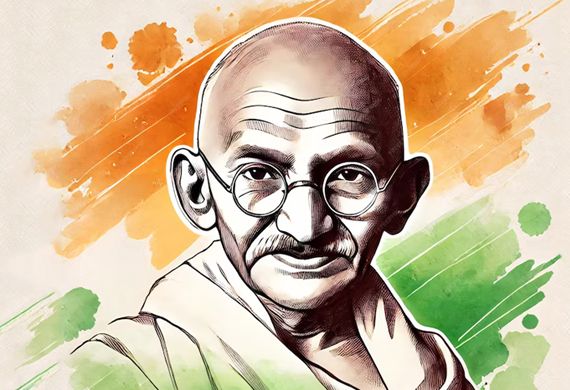
Gandhi Jayanti: Reminder of Truth, Peace & Women's Empowerment
By: WE Staff
Gandhi Jayanti marks as the symbol of truth, justice, and non-violence. Celebrated annually on October 2, it is the birth anniversary of Mahatma Gandhi, a revered figure in Indian history and a global icon of peace and non-violence.
Born in 1869, Gandhi led India's struggle for independence from British rule through his philosophy of ahimsa (non-violence) and satyagraha (truth and resistance to injustice). His teachings continue to inspire movements for civil rights and social change globally. Gandhi Jayanti is a day of reflection on his teachings of simplicity, truth, and individual and collective responsibility. As the world faces various challenges, Gandhi's ideals remain relevant, reminding us of the transformative power of non-violent resistance, unity, and ethical leadership.
Gandhi’s Views on Women’s Empowerment
Gandhi Jayanti also highlights the significant impact of Mahatma Gandhi's ideologies on women's empowerment in India. Gandhi, often referred to as the 'Father of the Nation', advocated for women's rights and actively participated in political, social, and economic spheres. His principles of non-violence, self-reliance, and dignity became the cornerstone of women's upliftment in India.
Mahatma Gandhi's Ideologies on Indian Women's Recognition
- Women are more fitted than men to make exploration and take bolder action in non-violence.
- There is no occasion for women to consider themselves subordinate or inferior to men.
- Woman is the companion of man, gifted with equal mental capacity.
- If strength is meant moral power, then a woman is immeasurably man's superior.
- If non-violence is the law of our being, the future is with women.
- Woman, I hold, is the personification of self-sacrifice, but unfortunately today she does not realize what tremendous advantage she has over man.
Gandhi believed that India's salvation relies on the sacrifice and enlightenment of women. He saw men and women as equals, complementing each other. He believed that if men and women work together with faith like him, they can achieve Ram Rajya, the perfect state. Women are traditionally called abala (without strength), but Gandhi suggested that when they become sabala, all those who are helpless will become powerful. Gandhi firmly opposed gender discrimination in India, arguing against the preference for boys and neglect of girls. He viewed gender differences as an anachronism and believed that both men and women have equal rights to live and contribute to the world. He called women the noble sex, embodying sacrifice and ahimsa. He believed that if a husband is unjust to his wife, she has the right to live separately. He advocated for the sharing of housework, encouraging women to do intellectual work and men to help with cooking, cleaning, and caring.
Gandhi's Ideologies align with Contemporary Feminists
Contemporary feminists analyze the factors shaping women's status, including sexism, racism, classism, and imperialism. This development aligns with Gandhi's Satyagraha, which sought creative solutions for all forms of oppression. In India and elsewhere, there are healthy movements of Gandhi's followers, but some divert from the actual path and his theories and open up new movements. Gandhi was not against any idea but formulated views on all aspects of a woman's life, political, social, domestic, and intimate, He rooted his views on distinctly Indian soil and aimed to change attitudes of society towards women and women about themselves too.
Gandhi was known for his high moral and conservative views but also embraced extreme liberalism through education. He believed that both men and women should be educated equally in housework, as the home belongs to both. Gandhi's approach to education was aimed at building a new society, and he consistently proposed constructive proposals to bring women out of their traditional mental fetters and into a better, dignified life.
Most Viewed
- 1 Women's Health Startup HerMD Closing Doors Amid Industry Challenges
- 2 5 Famous Women in Indian Armed Forces
- 3 Saudi Women No longer Require Male Permission for Clothing Choices, says Prince MbS
- 4 Kolkata Medtech Startup Innovodigm Raises Rs 5.5 Crore Seed Funding Led by IAN Group
- 5 Yamunanagar's Kashish Kalra Honoured after Securing 111th Rank in UPSC Civil Services Exam
- 6 Madurai Appoints Its First Woman Corporation Head
- 7 IAS Vijayalakshmi Bidari Appointed as the new Nagpur Divisional Commissioner
- 8 American Entrepreneur Lucy Guo Overtakes T Swift to become Youngest Female Billionaire
- 9 ICC Women's World Cup 2025 Trophy Showcased at Indore's Holkar Stadium
- 10 Aparna Saxena's Beauty Venture AntiNorm Launches in India
- 11 Vidya Nataraj Co-Founded BlueStone Jewellery & Lifestyle files IPO
- 12 5 Women Freedom Fighters of India
- 13 Dr. G Krishnapriya appointed as CEO for Trichy
- 14 M3M & Sirona Partner to Introduce Menstrual Hygiene Vending Machines in 15 Locations
- 15 Punjab Govt launches SHE Cohort 3.0 Supporting Tech-led Women Startups
- 16 Indian origin Lawyer, Sweena Pannu appointed as the US New Superior Court Judge
- 17 The Aurora Tech Award recognizes 4 Indian Women-led Startups
- 18 Kerala's Republic Day parade featured an all-female tableau
- 19 Manisha Kabbur Becomes Karnataka's First Woman International Karate Coach
- 20 Director K. S. Ravikumar's Daughter Maalica Ravikumar Launches Life Coaching Company 'Evergrowth Academy' for Women
- 21 Leezu's Raises Pre-Seed Funding to Accelerate Growth in Sexual Wellness Industry
- 22 Sattu: Super-easy summer drink for PCOS gut healing
- 23 Swathi Nelabhatla creates Sitha App, India's First Women-Exclusive Gig Platform
- 24 7 Timeless Female Kathak Dancers & their Iconic Legacies
- 25 Meet 7 Iconic Women Architects of Modern India & their Most Impactful Work
- 26 This Woman-led Insuretech Startup is Helping Bridge the Education Financing Gap in India
- 27 Women Leaders Share Lessons Learnt from India Women's WC Win
- 28 5 Enterprising Women Founders Powering Singapore's Tech & Innovation Landscape
- 29 4 Women. 4 Stories. One Vision for Smarter, Stronger Healthcare
- 30 Global Gender Gap Narrows to 68.8%, But Full Equality 123 Years Away: WEF Report 2025
- 31 Changemakers: 7 Women Entrepreneurs Taking the Make in India Movement Forward
- 32 Meet Lucy Guo, The Youngest Self-Made Female Billionaire Disrupting Tech
- 33 How Women are Driving India's Festive Online Shopping Surge






